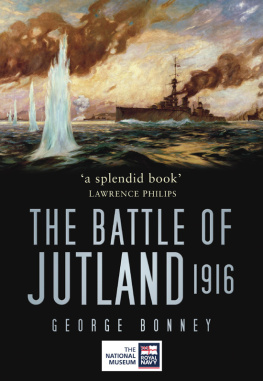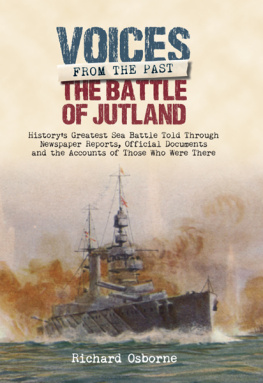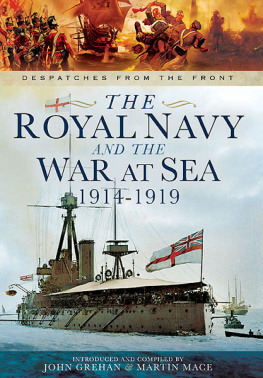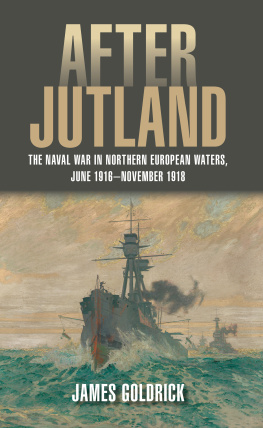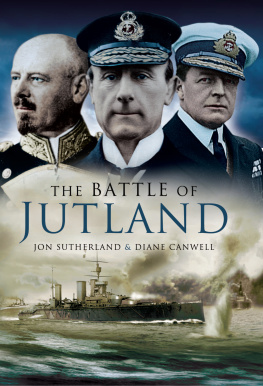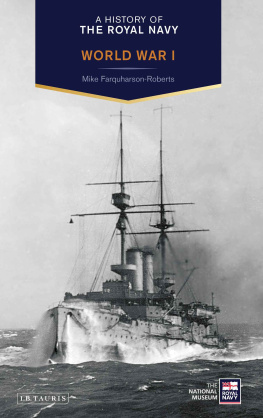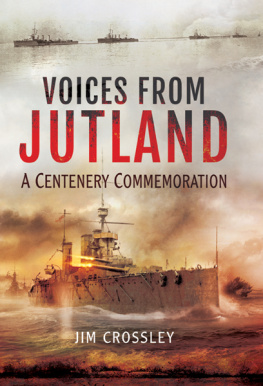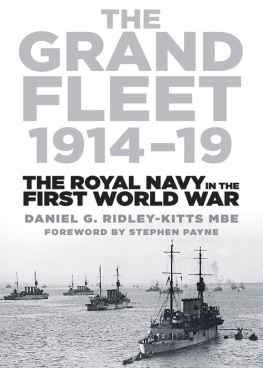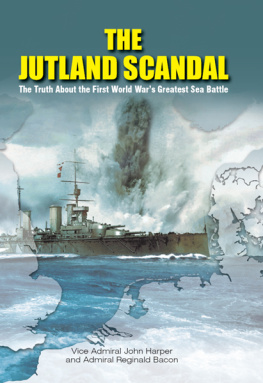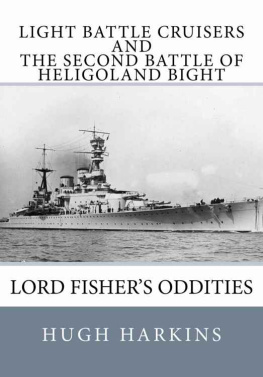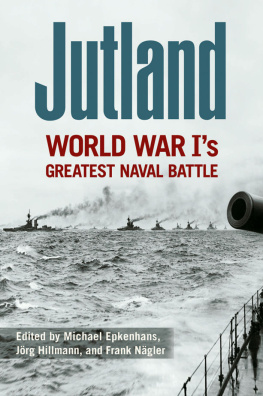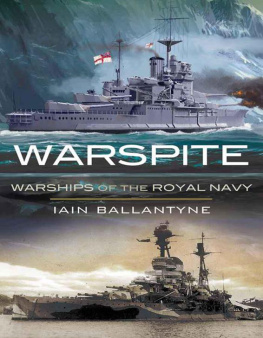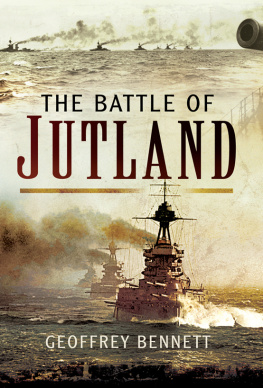THE BATTLE OF
JUTLAND 1916
To my wife,
formerly of
the
Q.A.R.N.N.S. (R)
THE BATTLE OF
JUTLAND 1916
GEORGE BONNEY

First published in 2002
Revised paperback edition first published in 2006
This edition published in 2010
The History Press
The Mill, Brimscombe Port
Stroud, Gloucestershire, GL 5 2 QG
www.thehistorypress.co.uk
This ebook edition first published in 2013
All rights reserved
The Estate of George Bonney, 2002, 2006, 2010, 2013
The right of George Bonney to be identified as the Author of this work has been asserted in accordance with the Copyrights, Designs and Patents Act 1988.
This ebook is copyright material and must not be copied, reproduced, transferred, distributed, leased, licensed or publicly performed or used in any way except as specifically permitted in writing by the publishers, as allowed under the terms and conditions under which it was purchased or as strictly permitted by applicable copyright law. Any unauthorised distribution or use of this text may be a direct infringement of the authors and publishers rights, and those responsible may be liable in law accordingly.
EPUB ISBN 978 0 7524 9584 2
Original typesetting by The History Press
CONTENTS
Links between Britain and Germany; unification of Germany; her industrial development; limits imposed by Britains command of the seas; Bismarck; Kaiser Wilhelm II; Tirpitz and the German Navy; the state of British armed services at the end of the nineteenth century. The rise of the Imperial German Navy
The Boer War and the assertion of Britains right to control arms shipments; assertions of German interests in North Africa and the Balkans
Admiral Sir John Fisher: his methods and achievements; the reforms of the Royal Navy and the development of the Dreadnought; Fishers fall and later return to the Admiralty; his final fall in 1915
His lineage and early career; appointed First Lord; activities in that post; the development of the Queen Elizabeths; Churchills role in the growing contest with Germany; his fall after the Dardanelles failure and later return to office
Early days of German sea power; the development of the German High Sea Fleet by Wilhelm II and Tirpitz; the Kiel (Nord-Ostsee) Canal; the risk theory; feelings of inferiority to the Royal Navy; excellence of construction of German ships
Understanding between French and British army staffs; the Austro-German alliance; the assassination of Archduke Franz Ferdinand at Sarajevo; Austrian ultimatum to Serbia; attempts to preserve the peace; the equivocal British response; attitude of Russia; invasion of Serbia and Belgium; involvement of the Great Powers including Britain; early moves in the First World War
Penetration of the German codes; the role of the Royal Navy; the Grand Fleet and its anchorages, its strengths and weaknesses; the High Sea Fleet and its anchorages, its particular strengths
British commanders: Jellicoe, his wide knowledge and experience; his caution; Beatty, his background and aggressive spirit; his relative inexperience in command of fleets; Evan-Thomass career; his appointment to command the Fifth Battle Squadron. German commanders: Scheers experience and resolute character; Hippers aggressive temperament and tactical skills
Protection; guns and control of gunfire; the underwater threat from torpedoes and mines; protection against these; the advantage of speed and the use of smoke; Grand Fleet Battle Orders; experience in battle, 1914 to 1916; signalling defects in the Battlecruiser Fleet
The Grand Fleet and the Battlecruiser Fleet put to sea; the German Fleet puts to sea; accidental meeting of the light cruiser screens of the scouting forces; the battlecruiser engagement; British casualties; intervention of the Fifth Battle Squadron; High Sea Fleet sighted
British battlecruisers and Fifth Battle Squadron turn to the north; perilous situation of the Fifth Battle Squadron; Beatty leads battlecruisers across the German line of advance; the Grand Fleet sighted; deployment of the Grand Fleet; disaster hits Third Battlecruiser Squadron and Arbuthnots cruisers; clash between the battlefleets; first German turnaway
Second German advance; Scheers probable intentions; second clash between battlefleets; second German turnaway; Grand Fleet turns away in response to torpedo threat; both fleets steam south, with British between German Fleet and its bases
Night stations; intermittent clashes between fleets; the German routes home; Jellicoe declines opportunity to place his fleet to guard the inshore route; possible reasons for that decision
The Jutland communique; gloom in the Fleet and country; rejoicing in Germany; the decision in favour of unrestricted submarine warfare; subsequent German sorties; later careers of British and German commanders
The Beatty-Jellicoe controversy; probable consequences of defeat of Grand Fleet; consequences of the failure to cripple the German Fleet; the legacy of Jutland and its effect on the performance of t Royal Navy in the Second World War; the strategic lesson of the irrelevance of the battleship in the age of air- and submarine-launched torpedoes; defects in large organisations and the role of the whistleblower in maintaining efficiency
PREFACE TO FIRST PAPERBACK EDITION
I am very grateful to Sutton Publishing for the opportunity to revise the text and illustrations of The Battle of Jutland 1916 afforded by the production of the paperback edition. I received many letters about the first edition of the book: all were welcome, some, more welcome than others. One reviewer criticised the asides and the occasional discuvsiveness: I appreciate his concerns, but I hope that most readers will agree with me in thinking that many of these digressions add to our understanding of the people and events here described. After all, this is not and is not intended to be, simply a technical description of the battle. For me, the most useful comments were those in which error and omission were indicated. I am very grateful to all who took the trouble to write, and hope that I have at least reformed things indifferently, if not altogether. It is invidious to mention names, but I feel bound to record the particular contributions from the late Godfrey Carter CBE, formerly of Parliamentary Counsel and of the Rifle Brigade, Seor Fernando Garcia Llaneras of Modesto Lafoente, Spain; Professor Richard Johns PhD; David Dawson FRSA and Vicky Dawson, my younger daughter. I had help, too, from Robert White, of the Imperial War Museum and Michael Chambers, of the Humanities Reference Service of the British Library. I am much grieved to have to record the death of Dr Chris Howard-Bailey, formerly Keeper of Collections and Head of Publications at the Royal Naval Museum, Portsmouth, a prime mover in the genesis of this work. I only wish that the book might be thought worthy to stand as part of the memorial to her and her work.
INTRODUCTION TO THE FIRST EDITION
I t is bold, perhaps even rash, to propose to add to the literature about the Battle of Jutland, which has over the last eighty-five years been examined in detail by naval historians expert in their subject and by serving or former naval officers with first-hand experience of battle. It is even bolder for one who has spent most of his working life in the study and practice of medicine to undertake such a task. A connection fifty-five years ago with the Royal Naval Volunteer Reserve and later with the Royal Naval Reserve offers little excuse. I only hope that my lifelong interest in the Royal Navy and my profound admiration for its officers, petty officers and ratings, combined with a belief that the lessons of the dreadful event and the origins of the conflict of which it was a part, are relevant to our present situation, will be seen to justify the present study. The work itself owes all to the real historians such as Correlli Barnett, Richard Hough, Arthur Marder, Stephen Roskill and others who have studied and written about the Royal Navy and the battle and its origins.
Next page
